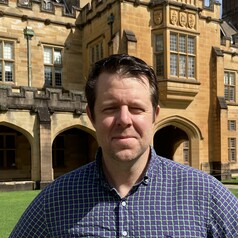
Hugh Thomas
Hugh is interested in the Neolithic to Bronze Age monumental landscapes of Saudi Arabia, specifically the transition from a ritual to funerary landscape that occurred in the region between c.5000-2800 BCE. This was part of his research in the Aerial Archaeology in the Kingdom of Saudi Arabia Project (AAKSA), a multifaceted project which he directed from 2020-2023, and included remote sensing, helicopter photography, ground survey, and excavation. The project identified hundreds of thousands of stone-built structures across the Northwest of Saudi Arabia. These include monumental Neolithic ritual structures known as ‘mustatil’, Bronze Age funerary structures, and domestic structures of all periods. This work will continue as the Prehistoric AlUla and Khaybar Excavation Project (PAKEP), recently started at the University of Sydney (2023-2027).
Less ![]()

Hugo Gaillard
Maître de conférences en Sciences de gestion, Le Mans Université
Docteur en Sciences de Gestion
Maître de Conférences en Management
Laboratoire ARGUMans, Le Mans Université
Thématiques de recherche :
- postures de régulation de l'expression religieuse au travail
- carrières durables et nouvelles formes de travail
- partage de la gouvernance et performance(s)
Docteur en Sciences de Gestion
Maître de Conférences en Management
Laboratoire ARGUMans, Le Mans Université
Thématiques de recherche :
- postures de régulation de l'expression religieuse au travail
- carrières durables et nouvelles formes de travail
- partage de la gouvernance et performance(s)
Less ![]()

Hugo Loning
PhD candidate in Behavioural Ecology, Wageningen University
Hugo Loning completed his Bachelor in Biology at the Universiteit Leiden in 2014 with a thesis on anthropogenic noise effects on blackbird song. Becoming more and more interested in animal ecology and bioacoustics, he continued his studies at Wageningen University. Here he conducted research on artificial light colour effects on bat roosting ecology at the Netherlands Institute of Ecology (NIOO-KNAW) and conducted a comparative study on acoustic adaptation in neotropical frog species in Panama in collaboration with the Vrije Universiteit Amsterdam and the Smithsonian Tropical Research Institute. After obtaining his Master degree in Biology in 2018, he continued as PhD at the Behavioural Ecology Group in Wageningen. Here he studies vocal communication in wild zebra finches. This is done under supervision of Marc Naguib (Wageningen University) and in collaboration with Simon Griffith (Macquarie University, Sydney).
Less ![]()
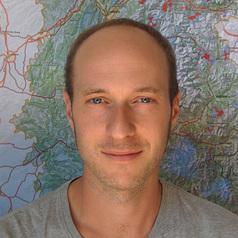
Hugues François
Ingénieur de recherche tourisme et système d'information, Inrae
Mon doctorat mobilise la théorie des ressources territoriales pour proposer une approche originale de la diversification comme une transition de la valorisation de ressources génériques vers celle des ressources spécifiques. Mes travaux plus récents visaient à donner un cadre pour la généralisation de ces travaux en construisant la BD Stations. Durant les dernières années, cette BDD a notamment permis de développer une chaine de modélisation numérique de l'enneigement des domaines skiables originale, en collaboration avec le CNRM Centre d’étude de la neige.
Less ![]()

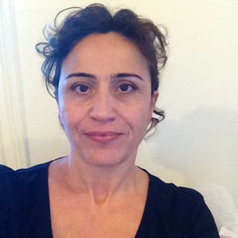
Hulya Dagdeviren
Professor of Economic Development, University of Hertfordshire
Hulya Dagdeviren is Professor of Economic Development at the Business School of University of Hertfordshire. Her research has focused on privatisation of public services and poverty and inequality. She published widely on water and electricity sector reforms. Her recent publications are on contractual disputes and renegotiations in privatised public utilities.
Less ![]()
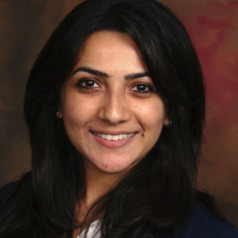
Huma Saeed
Assistant Professor of Medicine, Division of Infectious Diseases, Schulich School of Medicine and Dentistry, Western University
Dr. Saeed received her medical degree at King Edward Medical University, Pakistan. She subsequently pursued her post-graduate medical training in the United States, completing her residency in Internal Medicine at University of Chicago (NorthShore), fellowship in Infectious Diseases at Rush University Medical Center and advanced fellowship in Transplant Infectious Diseases at the Mayo Clinic, Rochester. She is ABIM and Royal College board certified in Internal Medicine and Infectious Diseases. Her areas of clinical expertise and research interests include infections in immunocompromised hosts, solid organ and stem cell transplantation and HIV/AIDS. Her research work focuses on evaluating solid organ transplantation outcomes in Patients Living With HIV (PLWH) as well as HIV/Hepatitis B and HIV/Hepatitis C co-infected transplant recipients.
Less ![]()

Humeira Iqtidar
Dr Humeira Iqtidar joined King's College London in 2011. She has studied at the University of Cambridge (UK), McGill University (Canada) and Quaid-e-Azam University (Pakistan). Before joining King's, Humeira was based at the University of Cambridge as a fellow of King’s College and the Centre of South Asian Studies.
Humeira is a Lecturer in Politics of South Asia. She is also the Principal Investigator on the Tolerance in Contemporary Muslim Politics: Political Theory beyond the West project and Co-Convenor for the London Comparative Political Theory Workshop.
Research
Humeira’s research is concerned with exploring the contours of social and political theory particularly in the South Asian context. She is interested in the shifting demarcations of state and market, society and economy, secularism and secularization. She has carried out ethnographic research with two Islamist parties in Pakistan, Jamaat-e-Islami and Jamaat-ud-Dawa for her previous research project. Currently her research has two key strands. One explores ideas and practices related to tolerance within the Pakistani context. The other engages with the relationship between liberalization and piety in both UK and Pakistan.
Humeira's research has featured in interviews and articles in The Guardian, BBC World Service, Voice of America, Der Spiegel, Social Science Research Council Online, The Dawn, Express Tribune and Open Democracy.
Less ![]()
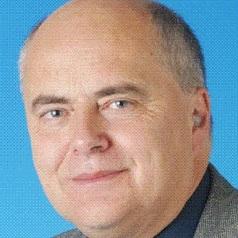
Humphrey Southall
Professor of Historical Geography, University of Portsmouth
Professor of Historical Geography at the University of Portsmouth. Principal creator of the Great Britain Historical GIS, and the web site "A Vision of Britain through Time".
Research interests include the history of the North-South divide in Britain, Data models for gazetteers and geospatial ontologies, Long-run impacts of locality characteristics on health inequalities and the role of travellers in the development of political life.
Less ![]()
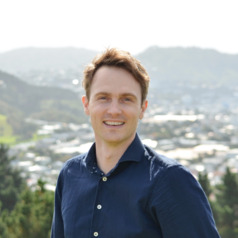
Hunter Douglas
PhD Candidate, Te Herenga Waka — Victoria University of Wellington
Hunter is a climate science PhD candidate with a background in environmental engineering. He holds master's degrees from the Massachusetts Institute of Technology and the Singapore University of Technology and Design, and a bachelor degree from Duke University. His current research concerns the pathway dependence of climate change emergence to greenhouse gas forcing in global climate models.
Born and raised in Wellington, New Zealand, Hunter has worked for science and engineering consultancies in the US and New Zealand. He is a Manager at PwC New Zealand, working in the Sustainability and Climate Change team on enabling the transition to a low-emissions economy.
Less ![]()
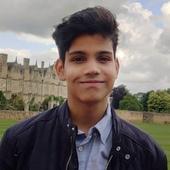

Huseyn Abdulla
Assistant Professor of Supply Chain Management, University of Tennessee
Dr. Huseyn Abdulla is an Assistant Professor of Supply Chain Management in the Haslam College of Business at the University of Tennessee. His research investigates and develops insights into operations and supply chain management challenges in the retail industry that have sustainability implications. Think of product returns management, retailing strategies for remanufactured consumer products, Scope 3 emissions in e-commerce, and business model innovations to address these. His research has been published in top-tier academic journals in the field of operations and supply chain management, such as the Journal of Operations Management, Manufacturing & Service Operations Management, and Production and Operations Management.
Less ![]()

Husna Ismail
Epidemiologist, National Institute for Communicable Diseases
Dr. Ismail is a Field Epidemiologist with formal training as a Medical Scientist, Epidemiology and Biostatistics. Dr. Ismail works at the Centre for Healthcare-Associated Infections, Antimicrobial Resistance and Mycoses at the National Institute for Communicable Diseases in Johannesburg, South Africa. Dr. Ismail has accumulated over ten years’ worth of experience in surveillance and outbreak response. Dr Ismail is currently involved in surveillance projects for antimicrobial resistance, one of them being the Global Antimicrobial Resistance Surveillance System.
Less ![]()
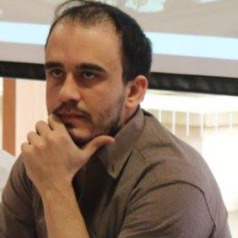
Hussein Abou Saleh
Docteur associé au Centre d'études et de recherches internationales (CERI), Sciences Po
Less ![]()
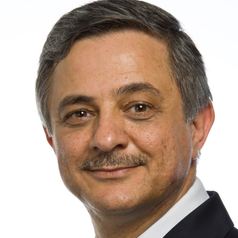
Hussein Dia
I am a Civil Engineer with credentials in Intelligent Transport Systems (ITS), transport planning and modelling. I have 30 years of engineering experience and have previously held a number of ITS positions including Director, ITS Research Laboratory at the University of Queensland and Director, ITS Australia.
My interests are in next generation smart infrastructure systems and the convergence of technology, infrastructure and human elements in our urban environments.
Less ![]()
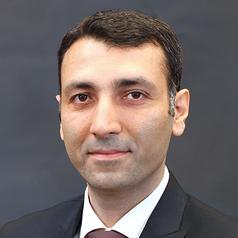
Hussein Gharakhani
Assistant Professor of Agricultural and Biological Engineering, Mississippi State University
Education:
Ph.D., Biosystems Engineering, Mississippi State University.
M.S., Mechanical Engineering of Agricultural Machinery, University of Tehran.
B.S., Agricultural Machinery Engineering, University of Tabriz.
Specialty Areas:
Robotic Manipulators
Robotic End-effectors
Artificial Intelligence
2D and 3D Perception
Sensors and Control Systems
Research Interests:
Agricultural Robotics and Automation
Simulation of Automated Agricultural Systems
Off-road Robots
Precision Agriculture
UGV and UAV Applications in Agriculture
Less ![]()
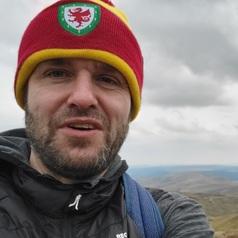
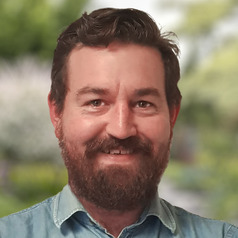
Huw Nolan
Animal Welfare scientist and pop culture researcher, University of New England
Huw Nolan is an animal welfare scientist at the University of New England, NSW. Huw’s research investigates the impact human imagination, beliefs and intuitions have on the welfare of animals. Huw is a co-founder of PopCRN, Australia's premier pop culture research network.
Less ![]()
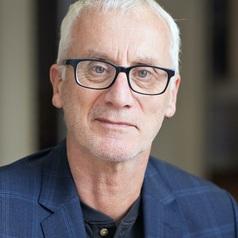
Huw Price
Emeritus Fellow, Trinity College, University of Cambridge
Huw Price is a Distinguished Professor Emeritus at the University of Bonn and an Emeritus Fellow of Trinity College, Cambridge. In Cambridge he was previously Bertrand Russell Professor of Philosophy (2011—20), Academic Director of the Leverhulme Centre for the Future of Intelligence (2016—21), and co-founder, with Martin Rees and Jaan Tallinn, of the Centre for the Study of Existential Risk. Before moving to Cambridge in 2011 he was ARC Federation Fellow and Challis Professor of Philosophy at the University of Sydney, where he was founding Director of the Centre for Time.
His publications include 'Facts and the Function of Truth' (Blackwell, 1988), 'Time's Arrow and Archimedes' Point' (OUP, 1996), 'Naturalism Without Mirrors' (OUP, 2011), 'Expressivism, Pragmatism and Representationalism' (CUP, 2013) and a range of articles in journals such as Nature, Mind, The Journal of Philosophy and the British Journal for the Philosophy of Science. He is also co-editor (with Richard Corry) of 'Causation, Physics, and the Constitution of Reality: Russell's Republic Revisited' (OUP, 2007).
He is a Fellow of the British Academy and a Fellow and a former Member of Council of the Australian Academy of the Humanities. He was consulting editor for the Stanford Encyclopedia of Philosophy from 1995-2006, and is an associate editor of The Australasian Journal of Philosophy and a member of the editorial boards of Contemporary Pragmatism, Logic and Philosophy of Science, the Routledge International Library of Philosophy, and the European Journal for Philosophy of Science.
Less ![]()
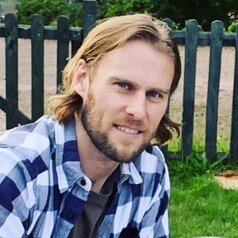
Huw D. Jones
Lecturer in Film Studies, University of Southampton
I am a Lecturer in Film Studies at the University of Southampton, UK. My teaching and research focuses on contemporary British and European cinema, with a particular focus on the film business and audiences. My latest book, "Transnational European Cinema: Representation, Audiences, Identity," is available now from Palgrave Macmillan.
- LinkedIn: https://www.linkedin.com/in/huw-d-jones-film/
- Staff profile: https://www.southampton.ac.uk/people/5xlmrz/doctor-huw-jones
- Book: https://doi.org/10.1007/978-3-031-44595-8
Less ![]()

Huw Thomas Peacock
Research assistant , University of Tasmania
Research assistant / Digital media engagement officer / MRes student
Less ![]()

Hyeng Keun Koo
Professor Emeritus, College of Business Administration, Ajou University
Koo is an financial economist as well as a mathematician. He has a PhD in mathematics from the University of Texas at Austin and a PhD in economics from Princeton University. He has taught at Washington University in St. Louis, US and at POSTECH and Ajou University in Korea. He has been studying portfolio choice models and their implications for asset pricing. He also a practical experience, having founded and managed FISTGlobal, Inc. The company was a leader in risk-management software and consulting company in Korea and has been succeeded by Metanet Fintech, Juro Instruments, and Tria. Koo is currently working on methodological development that help to automatize personal asset management.
Less ![]()

Hyeran Jo
Associate Professor of Political Science, Texas A&M University
Hyeran Jo is Associate Professor at the Department of Political Science at Texas A&M University in U.S.A. She studies international institutions, international law, and civil conflicts. Her book, Compliant Rebels: Rebel Groups and International Law in World Politics (Cambridge University Press, 2015), won the Chadwick Alger Prize in 2016, the best book in the field of international organization, awarded by the International Studies Association. Her work can also be found in journals such as International Organization, Journal of Conflict Resolution, British Journal of Political Science, Journal of Peace Research, and Law and Contemporary Problems. Her research has been supported by the U.S. National Science Foundation, Buffett Foundation, and Alexander von Humboldt Stiftung.
Less ![]()
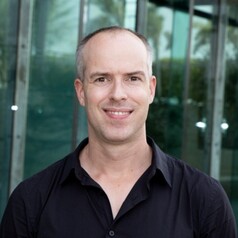
Hylke Beck
Assistant Professor, King Abdullah University of Science and Technology
Professor Beck's interests lie in leveraging the latest developments in machine learning, remote sensing, and modeling to recognize, understand, and manage climate hazards such as floods, droughts, and heat waves.
Less ![]()

Hysell V. Oviedo
Assistant Professor of Biomedical Research, Washington University in St. Louis
Less ![]()


Hyunseon Lee
Research Associate at Department of East Asian Languages and Cultures, and Centre for Creative Industries, Media and Screen Studies, SOAS, University of London
Hyunseon Lee, Ph.D. habil., is a London based film and media scholar. She is a Privat-Dozent in Media Studies and Modern German Literature at the Department of German, University of Siegen, and a Research Associate at Department of East Asian Languages and Cultures, and Centre for Creative Industries, Media and Screen Studies, SOAS, University of London. She is also a Professional Researcher at the Institute of Humanities, Yonsei University in Seoul.
She has lectured and published widely in the fields of German and comparative literature, film, and media studies, and held various scholarships and fellowships at Yonsei University and Seoul National University, Columbia University in New York City, and Chuo University in Tokyo, and at the Institute of Germanic & Romance Studies/ School of Advanced Study, University of London.
She is author of the books Metamorphosen der Madame Butterfly. Interkulturelle Liebschaften zwischen Literatur, Oper und Film (Heidelberg: University Press Winter, 2020), Geständniszwang und ‘Wahrheit des Charakters’ in der Literatur der DDR. Diskursanalytische Fallstudien (Stuttgart: J.B. Metzler, 2000), Günter de Bruyn – Christoph Hein – Heiner Müller. 3 Interviews (Siegen, MuK 95/96) as well as numerous articles on film, popular culture, gender, German literature and media aesthetics from a transcultural intermedial perspective.
She is co-editor of Mörderinnen (2013), Akira Kurosawa und Seine Zeit (2005), and Opera, Exoticism and Visual Culture (2015), and solo editor of two books Korean Film and Festivals: Global Transcultural flows (2022) and Korean Film and History (2023), both published by Routledge.
Less ![]()
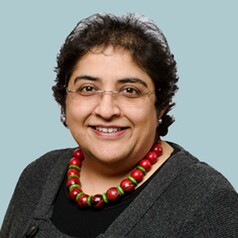
I. Sadaf Farooqi
Wellcome Principal Research Fellow and Professor of Metabolism and Medicine, University of Cambridge
My team studies the molecular and physiological pathways involved in the regulation of human appetite and body weight and their disruption in obesity. Some of the molecular pathways involved in regulating weight also regulate blood pressure and lipid metabolism, and affect an individual's risk of cardiovascular diseases.
One of the links between obesity and cardiovascular disease is leptin. We have identified mutations in leptin gene using candidate gene approach in patients with severe, early onset obesity, and have demonstrated that leptin contributes to hypertension in obese individuals. These results suggest that pharmacological approaches that modulate leptin’s effects on cells could represent a useful therapeutic strategy for the treatment of obesity-associated hypertension and might help prevent a subset of obesity-associated cardiovascular disease.
Less ![]()

Iain Black
Associate Professor in Marketing, Heriot-Watt University
I joined Heriot Watt as a Reader from the University of Edinburgh and before that held the post of senior lecturer at University of Sydney. My main interests revolve around sustainability. I am the Sustainable Consumption theme leader for the International Sustainable Development Research Society and my research focusses on anti-consumption, consumer’s responses to scarcity and how consumers dispose of goods. This has led to policy work exploring ways to rebalance dysfunctional relationships with materialistic consumption. http://allofusfirst.org/library/from-i-to-we-changing-the-narrative-in-scotlands-relationship-with-consumption/
Starting with an interest in how the Scottish Green party were influencing the Scottish Independence referendum, I have spent the last 4 years studying volunteer participation in this event and the marketing practices deployed, including the use of Hope vs Fear appeals. As part of this, I conducted what is the most comprehensive survey of the Yes volunteers to date, the findings of which, published by CommonWeal “available via http://allofusfirst.org/library/the-yes-volunteers-capturing-the-biggest-grassroots-campaign-in-scotlands-history
This work has been widely reported in new media outlets such as Bella Caledonia, Common Space and Independence live and the Scottish Independence podcast. It is also making its way through academic journal review processes.
Less ![]()
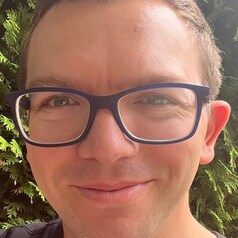
Iain Farquharson
Lecturer in Global Challenges – Security Pathway Lead, Brunel University London
I completed my PhD in Military History at Brunel in 2021. Prior to this I completed an MA in History at the University of Exeter in 2010 and my BA (hons.) in History at Brunel in 2009. My research examines the reform of officer education in the British Army between 1919 and 1939. I am also an Associate Fellow of the Royal Historical Society.
Between 2018-2020 and 2021-22, I taught as an adjunct lecturer on Brunel's BA International History and BA Military and International History courses. From October 2021 I taught the Security Pathway on the BASc Global Challenges course, before becoming the Pathway Lead from September 2022.
My research interests focus on military history in the first half of the Twentieth Century. My current work focuses on the development and change of education and training within the British and Imperial armies, primarily through the study of officer education at cadet colleges and staff colleges.
In addition I am undertaking research into the application of multi-disciplinary (primarily Sociological) theories of culture and institutional innovation to the study of military culture and how militaries respond to and assimilate reforms to fundimental aspects of their cultural norms.
Less ![]()
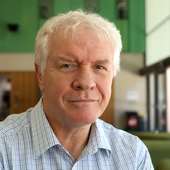
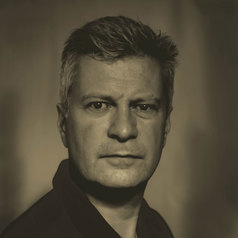
Iain Macdonald
My research interests are centred on how heritage (traditional handcrafts) and digital practices fuse to form hybrid methods in moving image design. Practice-led research into my own moving image work formed the core of my doctorate research. My work in education has also informed my pedagogic research into internationalisation, the moving image and lens-based media, forming an argument for future directions in art and design practice.
Less ![]()

Iain Perkes
Senior Lecturer, Child and Adolescent Psychiatry, UNSW Sydney
I am a Senior Lecturer at the UNSW, Sydney. I work as a child and adolescent psychiatrist in Sydney Children's Hospital Network where I lead the Kids Mental Health Research group and the clinical service for obsessive-compulsive disorder. I am an Associate Editor for the Australian and New Zealand Journal of Psychiatry. I am an Honorary Scientist with Neuroscience Research Australia and a Research Fellow at the Black Dog Institute. I contribute as a Governing Board member to NSW Health Higher Education Branch. I co-founded a national research collective - OCD BOUNCE - ocd.org.au
Less ![]()
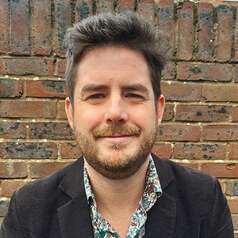
Iain Reid
Course Leader, MSc Cybercrime, University of Portsmouth
I am a Senior Lecturer in Cybercrime in the School of Criminology and Criminal Justice at the University of Portsmouth. I completed my PhD in Psychology at the University of Lincoln where my work focused on developing a holistic, risk-based and future focused approach to deception. I conducted my post-doctoral research at the University of Malta, and in the School of Computing at the University of Portsmouth, with my later research focusing on human cyber security risk across working age populations.
My current research focuses on social and behavioural approaches to cybercrime and security. I am currently exploring perceptions of security and risk amongst software developers, innovative approaches to cyber deception for defence, and digital footprints and emissions.
Less ![]()
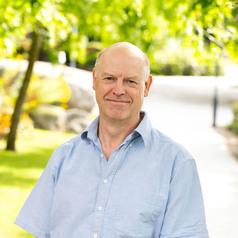
Iain Richards
Senior Lecturer, Animal Life, University of Central Lancashire
Iain is an innovative, enquiring veterinarian who combines 30 years’ clinical experience of all major species into a wider understanding of how ecology and ecosystem health affect animal and human epidemiology.
Iain will be involved in the creation of and teaching within the new veterinary school, bringing his wide experience of clinical practice and business skills into the syllabus
Iain has spent most of his working life as a mixed species practitioner, mostly in the north of England. He has progressed from assistant to sole owner, partner and finally as director of a two-site multi vet practice. During that time he worked intensively in the Foot and Mouth outbreak of 2001 gaining insight into disease control at an epidemic level. His practice was a founding member of XLVets UK and Iain later served on the board of Directors.
From 2011, he left clinical practice and combined househusband and childcare duties with occasional locum work, that included stints on the Isle of Mull and the island of St Kitts. From 2013-2106 he studied for and gained a Masters in Conservation Medicine through Edinburgh University, which rekindled a longstanding interest in ecology. This now provides his major area of interest in how the ecology of parasites needs to be understood in order to maintain sustainable control.
Less ![]()
- Market Data




















